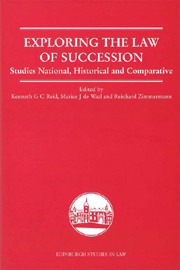Book contents
- Frontmatter
- Contents
- Preface
- List of Contributors
- List of Abbreviations
- Table of Cases
- 1 A Comparative Overview
- 2 Compulsory Heirship in Roman Law
- 3 Succession Law in Scotland – a Historical Perspective
- 4 Succession Law in South Africa – a Historical Perspective
- 5 Freedom of Testation and the Ageing Testator
- 6 Testamentary Conditions and Public Policy
- 7 Forfeiture Clauses and Events in Scots Law
- 8 Revocation of Wills by Changed Circumstances
- 9 Fideicommissary Substitutions: Scots Law in Historical and Comparative Perspective
- 10 The conditio si institutus sine liberis decesserit in Scots and South African Law
- 11 The New Dutch Law of Succession
- 12 Revocability of Mutual Wills
- 13 Succession Agreements in South African and Scots Law
- Index
9 - Fideicommissary Substitutions: Scots Law in Historical and Comparative Perspective
Published online by Cambridge University Press: 12 September 2012
- Frontmatter
- Contents
- Preface
- List of Contributors
- List of Abbreviations
- Table of Cases
- 1 A Comparative Overview
- 2 Compulsory Heirship in Roman Law
- 3 Succession Law in Scotland – a Historical Perspective
- 4 Succession Law in South Africa – a Historical Perspective
- 5 Freedom of Testation and the Ageing Testator
- 6 Testamentary Conditions and Public Policy
- 7 Forfeiture Clauses and Events in Scots Law
- 8 Revocation of Wills by Changed Circumstances
- 9 Fideicommissary Substitutions: Scots Law in Historical and Comparative Perspective
- 10 The conditio si institutus sine liberis decesserit in Scots and South African Law
- 11 The New Dutch Law of Succession
- 12 Revocability of Mutual Wills
- 13 Succession Agreements in South African and Scots Law
- Index
Summary
INTRODUCTION
Fideicommissary substitution lies at the boundary between succession law and property law. It belongs to a European tradition that is both common and fragmented. Comparative study has been slight. Indeed, even within national systems much of the history is obscure. The present essay looks at Scots law from a comparative and historical standpoint.
The starting point itself is problematic. Does this institution even exist in Scotland? Open the books, and search the cases: you will find virtually no discussion of this institution. Ask a Scots lawyer and he will not know even what you are talking about. So the answer to the question seems to be no.
If that is right, Scotland differs from many other countries. Fideicommissary substitution survives, albeit sometimes in only a very limited form, in such countries as Germany (Vorerbschaft and Nacherbschaft), Spain (sustitución fideicomisaria), Italy (sostituzione fedecommissaria), Austria (fideikommissarische Substitution) and the Netherlands. France had it until the Revolution, when it was supposedly abolished. But in fact a weak form of it survives there, for the provisions abolishing it were narrowly construed by the case law. As for the mixed systems, Louisiana in its 1808 Code adopted the French prohibition, and has retained it. Quebec took over the pre-revolutionary French law, which was that substitution was permitted but limited in the number of generations. It survives in the Philippines. Sri Lanka received it in its Roman-Dutch form, and retained it until 1972. In South Africa it survives.
- Type
- Chapter
- Information
- Exploring the Law of SuccessionStudies National Historical and Comparative, pp. 156 - 176Publisher: Edinburgh University PressPrint publication year: 2007



